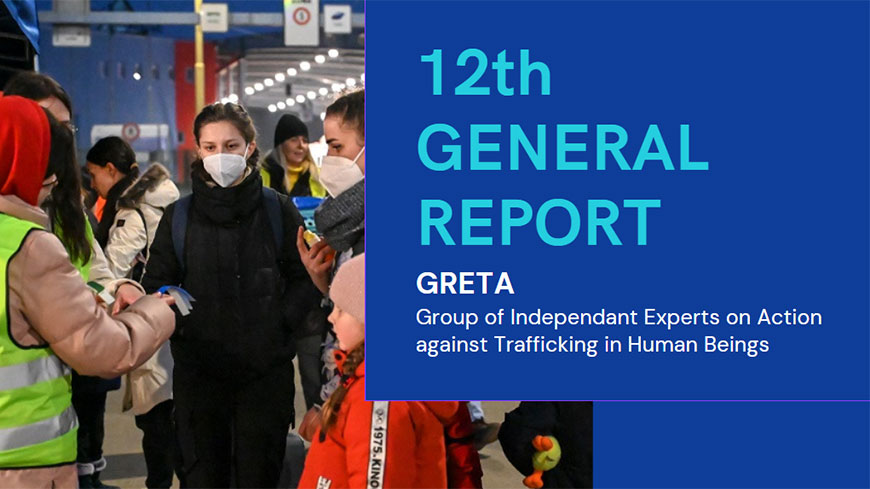The Council of Europe's Group of Experts on Action against Trafficking in Human Beings (GRETA) has today published its annual report for 2022 which provides an overview of its activities, including meetings, evaluation visits, country reports and round tables, as well as its co-operation with Council of Europe bodies, other international organisations and civil society, in order to prevent and combat human trafficking.
"The year 2022 was marked by Russia's military aggression against Ukraine, causing the largest population displacement in Europe since the Second World War," said GRETA President Helga Gayer, stressing that “GRETA reacted by issuing a statement warning of the dangers of people fleeing the armed conflict in Ukraine falling victim to human trafficking and exploitation, followed by the preparation of a related guidance note”. GRETA's report includes a thematic chapter devoted to managing the risks of human trafficking linked to the war against Ukraine, with practical measures that can be implemented to minimise them.
Another important development during 2022 was the adoption by the Committee of Ministers of a new recommendation to member States on preventing and combating trafficking in human beings for the purpose of labour exploitation. GRETA's annual report discusses the recommendation, which draws on GRETA’s monitoring work and is supplemented by an explanatory memorandum containing a comprehensive set of measures concerning prevention, protection, prosecution and partnerships.
In 2022, GRETA carried out evaluation visits on the implementation of the Council of Europe’s anti-trafficking convention in 13 countries (Azerbaijan, Estonia, Greece, Iceland, Lithuania, Netherlands, North Macedonia, Poland, Serbia, Slovenia, Spain and Sweden) and adopted final evaluation reports on 10 countries (Armenia, Belarus, Belgium, Bosnia and Herzegovina, Greece, Ireland, Luxembourg, North Macedonia, Norway and Portugal).
GRETA reports published in 2022 show that a number of improvements have been made by States to respond to human trafficking. However, gaps persist, and new challenges are arising, in particular those related to the increasing use of information and communication technologies. Some of the problems in the implementation of GRETA’s recommendations are due to lack of political will, resources and training. GRETA points in particular to the low number of convictions for trafficking in human beings, which is linked to overreliance on victim testimonies and the rapid return of victims to their countries of origin. In addition, the lack of effective access to compensation for victims of trafficking is also a problem highlighted in the report.
GRETA encourages States Parties to the convention to pursue the fight against trafficking in human beings by strengthening national strategies, resources and partnerships.
GRETA is responsible for evaluating compliance with the Council of Europe Convention on Action against Trafficking in Human Beings by States Parties. It is the only independent group of experts to monitor the implementation of binding international legal provisions in this area. Entering into force in 2008, the Convention has been ratified by all 46 member States of the Council of Europe, as well as by two non-member States, Belarus and Israel.




